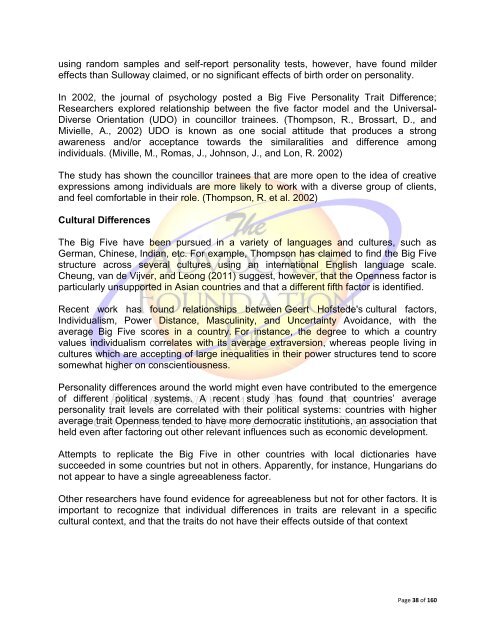The Gift of Introversion
The Gift of Introversion
The Gift of Introversion
Create successful ePaper yourself
Turn your PDF publications into a flip-book with our unique Google optimized e-Paper software.
using random samples and self-report personality tests, however, have found milder<br />
effects than Sulloway claimed, or no significant effects <strong>of</strong> birth order on personality.<br />
In 2002, the journal <strong>of</strong> psychology posted a Big Five Personality Trait Difference;<br />
Researchers explored relationship between the five factor model and the Universal-<br />
Diverse Orientation (UDO) in councillor trainees. (Thompson, R., Brossart, D., and<br />
Mivielle, A., 2002) UDO is known as one social attitude that produces a strong<br />
awareness and/or acceptance towards the similaralities and difference among<br />
individuals. (Miville, M., Romas, J., Johnson, J., and Lon, R. 2002)<br />
<strong>The</strong> study has shown the councillor trainees that are more open to the idea <strong>of</strong> creative<br />
expressions among individuals are more likely to work with a diverse group <strong>of</strong> clients,<br />
and feel comfortable in their role. (Thompson, R. et al. 2002)<br />
Cultural Differences<br />
<strong>The</strong> Big Five have been pursued in a variety <strong>of</strong> languages and cultures, such as<br />
German, Chinese, Indian, etc. For example, Thompson has claimed to find the Big Five<br />
structure across several cultures using an international English language scale.<br />
Cheung, van de Vijver, and Leong (2011) suggest, however, that the Openness factor is<br />
particularly unsupported in Asian countries and that a different fifth factor is identified.<br />
Recent work has found relationships between Geert H<strong>of</strong>stede's cultural factors,<br />
Individualism, Power Distance, Masculinity, and Uncertainty Avoidance, with the<br />
average Big Five scores in a country. For instance, the degree to which a country<br />
values individualism correlates with its average extraversion, whereas people living in<br />
cultures which are accepting <strong>of</strong> large inequalities in their power structures tend to score<br />
somewhat higher on conscientiousness.<br />
Personality differences around the world might even have contributed to the emergence<br />
<strong>of</strong> different political systems. A recent study has found that countries’ average<br />
personality trait levels are correlated with their political systems: countries with higher<br />
average trait Openness tended to have more democratic institutions, an association that<br />
held even after factoring out other relevant influences such as economic development.<br />
Attempts to replicate the Big Five in other countries with local dictionaries have<br />
succeeded in some countries but not in others. Apparently, for instance, Hungarians do<br />
not appear to have a single agreeableness factor.<br />
Other researchers have found evidence for agreeableness but not for other factors. It is<br />
important to recognize that individual differences in traits are relevant in a specific<br />
cultural context, and that the traits do not have their effects outside <strong>of</strong> that context<br />
Page 38 <strong>of</strong> 160

















